Inside the horrifying guts and darkwave glory of Boy Harsher’s new film, The Runner
The duo discuss their new movie and its official soundtrack, out today via Nude Club.
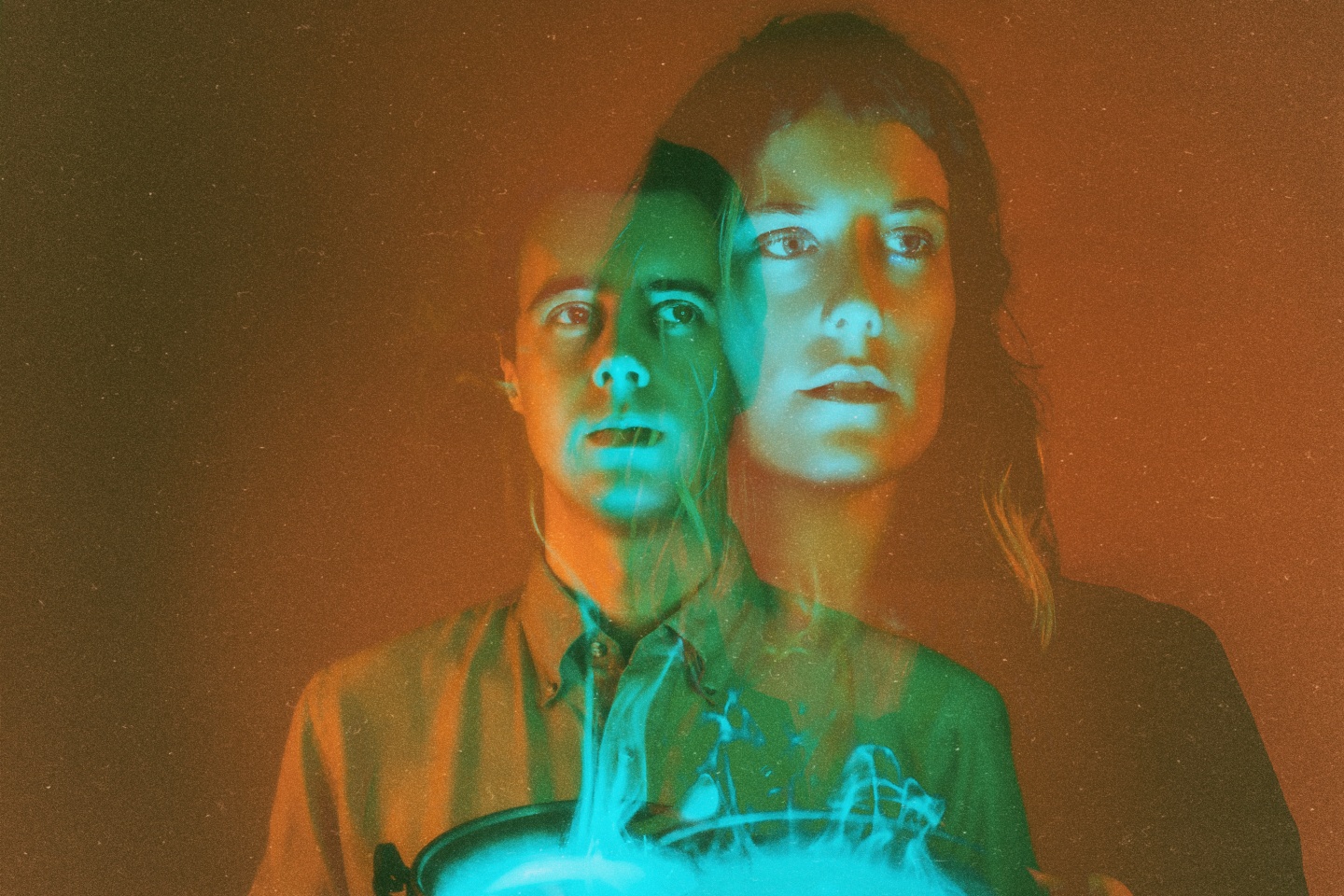 Photo by Courtney Brooke.
Photo by Courtney Brooke.
“She’s reckless, and out of control, and it’s pure evil,” Jae Matthews says in a voiceover near the end of her new horror film, The Runner, discussing the movie’s murderous protagonist. “But there’s a human side to her too, and I hate to say it, but I can kind of relate.”
Jae and Augustus “Gus” Muller are Boy Harsher, a singer-producer duo whose music stimulates the body first and the mind second. They met as film students in Savannah, Georgia when Jae spotted Gus dancing to “Bizarre Love Triangle” at a party. A decade later, the rest is discography: two albums, three EPs, a dozen-odd cinematic music videos, and now, a 40-minute film. Alternately brooding and bombastic, they deal in shouts and whispers, Gus’s propulsive rhythms peppered with stadium blasts and Jae’s slasher-worthy screams. Their songs detail escapes, benders, breakups, and reunions, plumbing the pair’s stormy past even as they settle into domestic life together in Northampton, Massachusetts.
Their last album, 2019’s Careful, was a darkwave manifesto that could have easily soundtracked Lost Highway’s long, tense driving sequences. But instead of waiting for the next David Lynch film, Jae and Gus decided to direct their own. The Runner follows a mysterious femme fatale (NGHTCRWLR/King Woman’s Kris Esfandiari) on a string of gory killings, some of them revenge driven, others pure bloodlust. There are moments where she seems ready to stop — twice she calls a man who begs her to come home — but seems unable to retract her fangs for more than a few hours at a time.
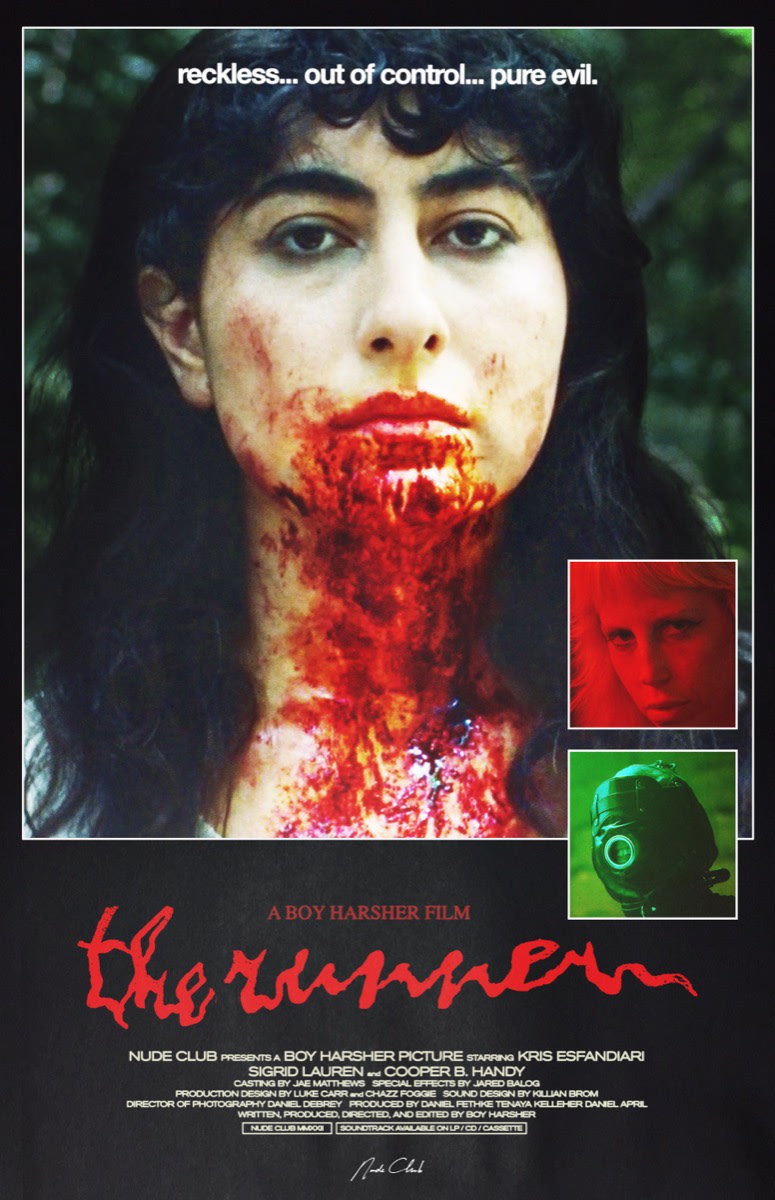 Film poster for The Runner, now streaming on SHUDDER.
Film poster for The Runner, now streaming on SHUDDER.
The film’s narrative sequences are interspersed with “behind-the-scenes'' footage, framed by a campy TV show called Flesh First. Most of these moments are tongue in cheek, but some are heartfelt. “I’d still be making this stuff if no one was listening,” Gus says while showing off the Roland linear synth he claims got him into music. “I can feel pretty broken sometimes, and there’s something about sticking your hands in these sounds, and controlling them, that makes me feel normal, at least for a little while.”
Jae never mentions it in the movie, but she wrote the lyrics to its songs while convalescing from treatment for multiple sclerosis, which she was diagnosed with mid-pandemic. Despite its moments of schtick, The Runner has serious undertones.
When I meet with Jae and Gus over Zoom, they’re holed up in their New England home during the first truly frigid week of the young winter. Due to the rise of omicron, their first tour since the start of lockdown (which should have begun yesterday in Boston) has just been postponed. The unfortunate news on the eve of The Runner’s release has returned them to a liminal state, dreaming of bodily escape but settling for journeys of the mind.
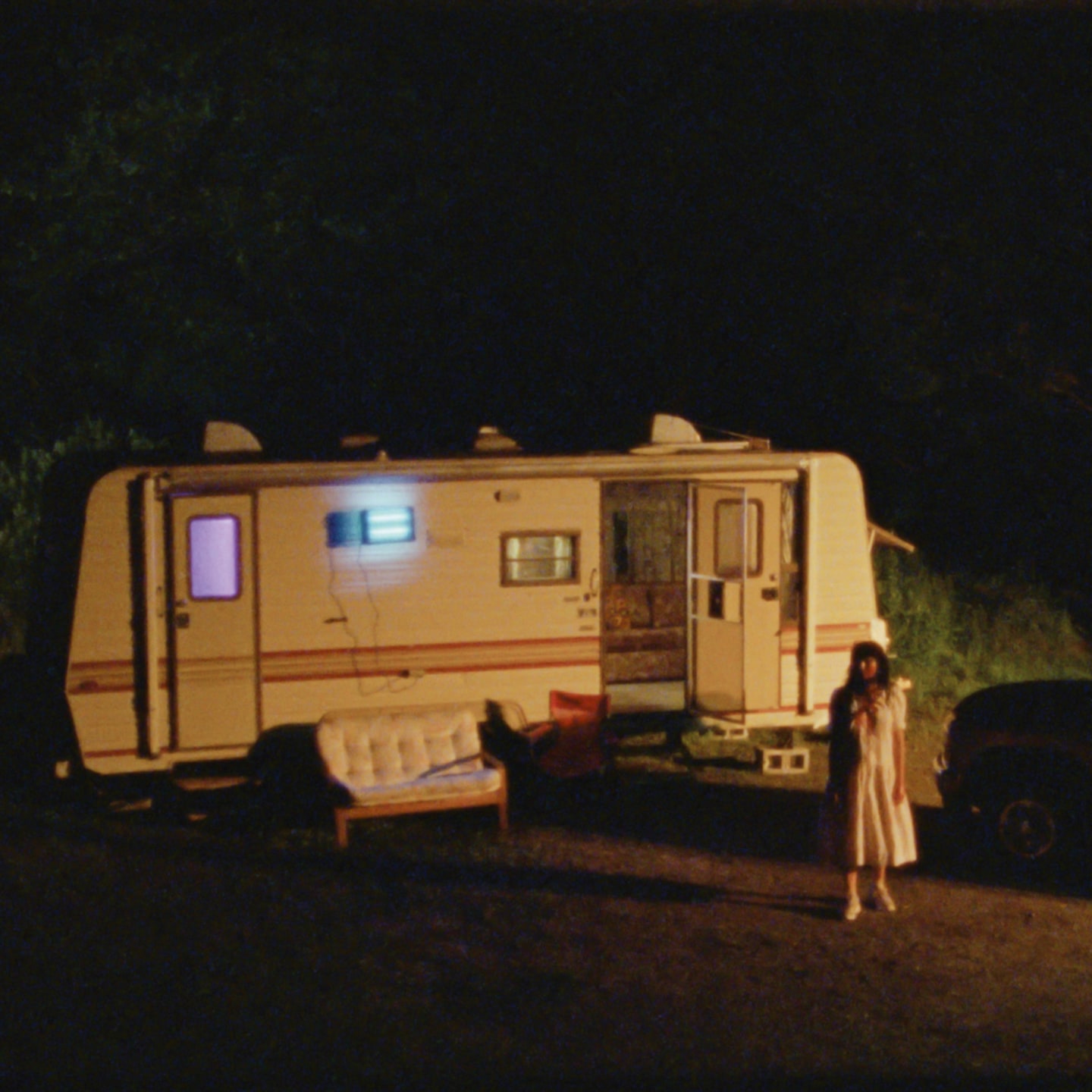 Album art for The Runner (Original Soundtrack), out today via Nude Club.
Album art for The Runner (Original Soundtrack), out today via Nude Club.
The FADER: How do you feel about the tour getting pushed back? Were you anxious to get back out there? Are you a little relieved?
Jae Matthews: We're in limbo. COVID is funny because, during the isolation, you knew your shows were canceled and you're like, "All right, I'm buckling in." But now everything has been so off and on; that's what's frustrating. It's really hard to predict your life. We were looking forward to going on the road.
I’ve had some of my most visceral experiences with live music at your shows, and I've always been curious about your ritual. How do you recuperate between these extreme moments of catharsis?
JM: When the show's done, everyone's packing up and I'm in the green room, getting drunk — either alone or with some poor sucker I've convinced to sit with me. Then we drive an hour or two outside the city, and I talk extensively to the driver, who's probably super annoyed. You're putting a lot out there and you're raging. There's so much adrenaline. It's hard to shut down at the end of the night. Then we wake up early for the next city. I reserve a bench seat, and there's no music being played, because I literally have to sleep that whole time. I don't know what will change with my MS diagnosis. We've only played five shows since I got treatment, and they were really separated, so it's not enough to gauge. Sleep is this crazy fundamental thing now. If I don't recharge the right way, that's when I start getting flares. I hope I can find a way to maintain energy.
You’ve been living in Northampton for the better part of a decade now. Tell me about your community there.
Augustus Muller: There's no area like Western Mass when it comes to experimental and DIY music. You can play the worst set of your life, but in Northampton, people will be like, "That's the best set I've ever seen!" Everyone’s so open and supportive. When we got here, we played a lot of really cutty basement shows. They were messy, but having that energy given back to us was what we needed at the time.
JM: Everyone here has their own side project. It's nice to be in a community that engages in that way. House shows were what created Boy Harsher.
Do you think you're settled there for the foreseeable future?
AM: It was working out, but now that shows are on the brink of extinction, I don't think we're getting enough of what we need. Traveling was fulfilling that.
JM:. Gus and I are both very travel-type people — rambling around, waking up and going "Man, I have this unsettled anxiety. Let me drive for four hours and think about it." And now we're at a place where we no longer do that, and where it's cold as shit for seven months. We often talk about the next place.
AM: I’m trying to convince Jae to go L.A. psycho with me — get out there and start wearing leather jackets.
JM: I compromised and said I would live in Joshua Tree, but Gus says that’s not good enough. I get distracted really easy. Small towns and rural places are helpful because, in cities, I just cannot stay home and sit in, especially when I’m living in a box. I'm incredibly social, so one way to remedy that is to put me in the middle of the desert and take away my car. Sometimes you need to do it to get work done.
The Runner is full of references to horror classics. There’s a lot of David Lynch, some Argento, and a little Cronenberg body horror too. Who are some of your favorite horror filmmakers?
JM: When I was 18 I watched all of [Cronenberg’s movies] together. His earlier films really defined this genre: the horrific transformation of one's body, which is what I was most interested in. Rabid and The Brood are a little tacky, but they really get the point across. Those films are visceral! And Possession by Andrzej Żuławski — what sticks with me is the character of Anna. She’s presented as a villain, but she's totally my hero. The dissection of sexuality is something I'm highly into.
If you could rescore an existing horror movie, what would it be?
AM: When they remake The Stand again and try to make it a little darker, I can help set the mood. I'd want an assignment — not to work with an auteur, but to take a world, like The Stand, and build on it.
JM: We’d love to do a score for Julia Ducournau. We watched Titane and were like, "Oh my God, we want to be part of this world!” That’s one thing COVID has taught us: there’s nothing like watching a movie in the theater. We really missed out on that when we were touring endlessly for five years. One of the first public spaces that opened around here was the movie theater, and we went a lot.
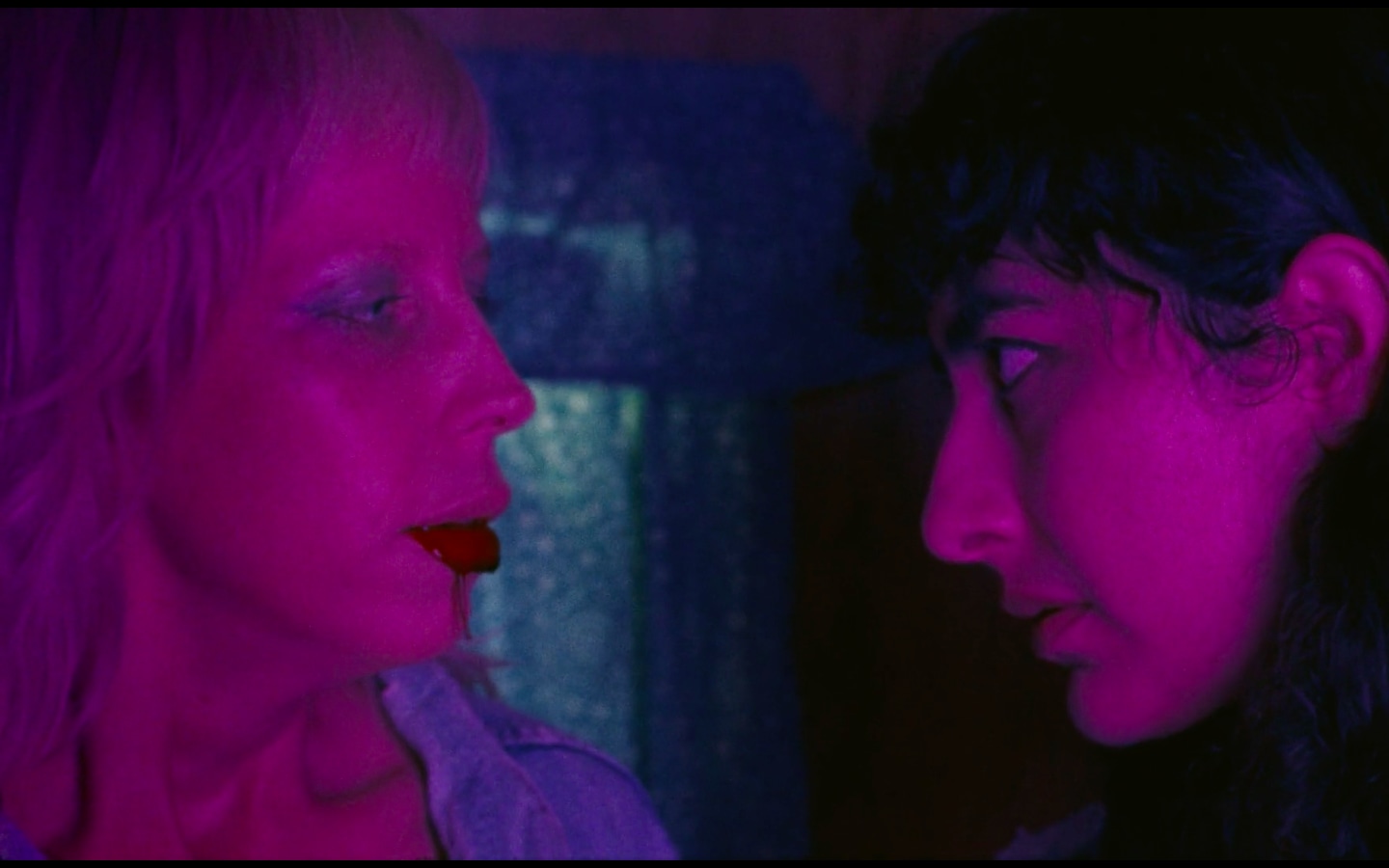 Sigrid Lauren and Kris Esfandiari. Still from The Runner.
Sigrid Lauren and Kris Esfandiari. Still from The Runner.
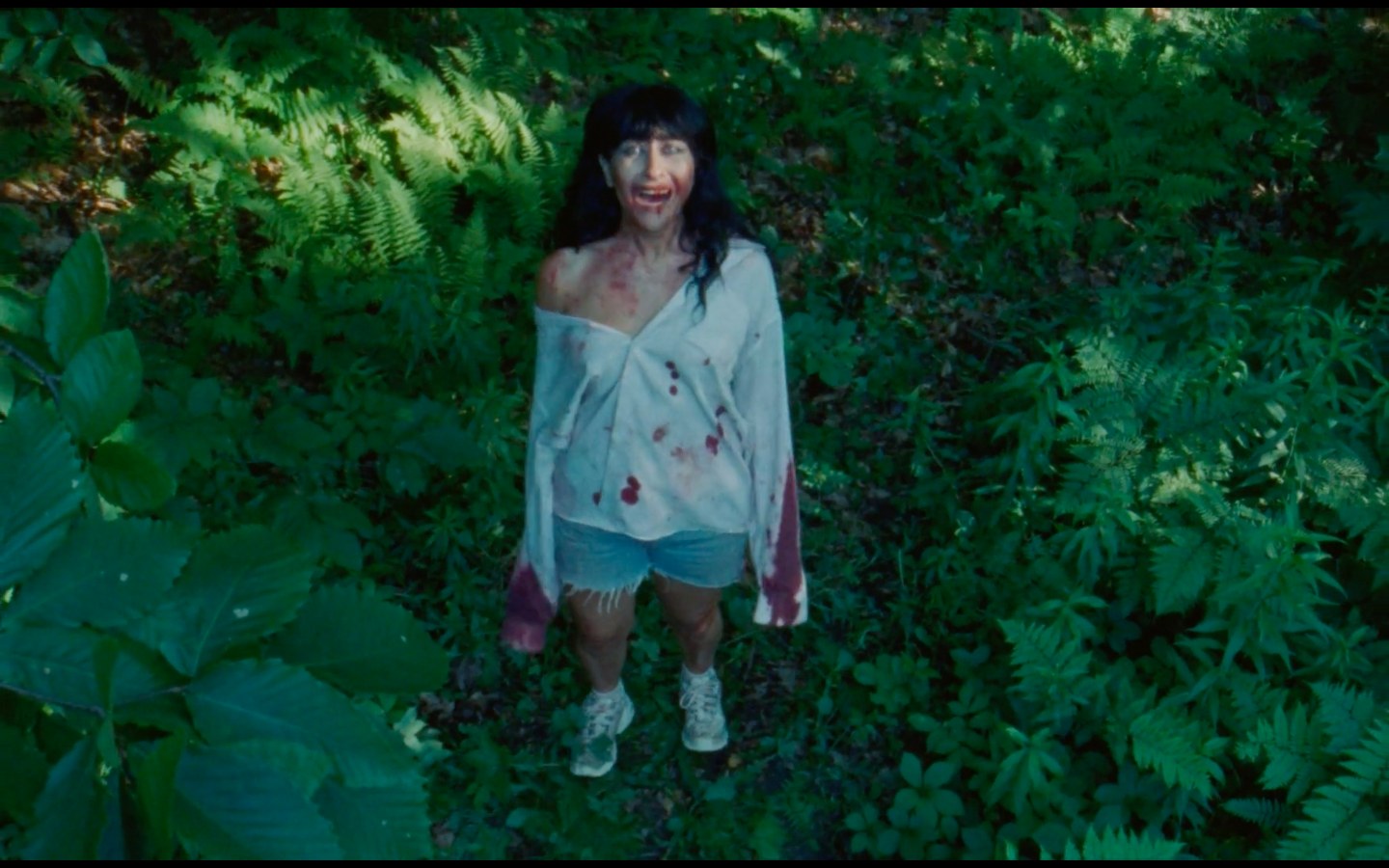 Kris Esfandiari. Still from The Runner.
Kris Esfandiari. Still from The Runner.
The Runner deals pretty directly with the theme of escape, which you’ve been playing with in your music forever. What made you decide to manifest it here as a murder spree?
JM: It’s a motif we return to because it’s a fantasy everyone has. Part of the reason we love driving around is that the idea of disappearing is so alluring. For The Runner, we had the idea for this character who needs to flee all these disastrous situations she herself has created; she's the ultimate self-saboteur. We write about that person because that person is us.
The movie’s meta documentary ends with an interviewer asking you, Jae, if you see yourself in the character of The Runner. To what extent do either or both of you identify with your protagonist? Do you identify with the man on the phone saying "Stop, you don't have to do this,” too?
AM; The voice on the phone is a character I created 10 years ago called The Desperate Man. He’s constantly making cameos in our work.
JM: The Desperate Man showed up in a film Gus made 10 years ago, played by Troy Wandzel, who continued into Boy Harsher's career, doing vocal samples on Careful. He’s still The Desperate Man on the phone. There's only one Desperate Man.
AM: It’s always these same characters, who are maybe our alter egos. We just rearrange and make new scenarios for them.
JM: We're old now, and we’re in a pretty locked life situation. You can no longer be the little monster that lives inside you. But you can write that little monster into any situation you'd like, when you’re an artist.
Do you think you can make more productive art while you actually are that little monster, or in retrospect?
JM: That's hard to say. When I was younger, I thought those scenarios were important for my writing, so I could “gather data.” But as you get older, it stops being cute. No one wants to see a really sloppy 40 year old. I'm not 40.
AM: Yeah, what’s with this “we’re old” thing?
JM: I'm looking into the future. You can't do what you did when you were young. A lot of what we write about exists in the world of the young — being a mess.
How did you choose Kris Esfandiari for the role of The Runner? She's got such an expressive face, which is important since she never speaks in the movie.
JM: I mentioned earlier that after playing a set I harass a driver for hours. That's what Kris and I did on this NGHTCRWLR/Boy Harsher tour. It was a cold, brutal midwest winter tour. We were in the back of the van, keeping our tour manager, Sky, awake as she drove. And the three of us would talk about these stories we wanted to create. More often more than not, they were horror stories. The Runner wasn't called The Runner at the time, but it was an idea I was cultivating. And I really saw Kris as the character, after watching her as NGHTCRWLR for 20 days, seeing what she could do. She is, as you said, incredibly emotive while doing incredibly subtle things.
The meta music doc cuts the horror of the movie, but it's a fun glimpse into your world. Was there ever a version of The Runner that didn't have those scenes?
AM: Well, it started as a live-stream idea — 50 percent live performances, 50 percent narrative. And then we started having a lot of fun with the narrative, so that took over. But it's a music film and our music is scoring these scenes, so it’s important to have those cutaways to motivate where the sounds come from.
JM: And to suggest some sense of ownership. We have a tendency to create visuals that don't reference us at all, so it was important to us to put Jae and Gus in as Boy Harsher in some regard.
“Machina” and “Autonomy” are the two songs on the soundtrack where a guest singer steps in for Jae. Gus, how was your creative process different for these tracks? Did you have Mariana Saldaña and Lucy in mind from the start?
AM: Over a year ago — deep COVID winter — I was working on a solo record, and I was sending around instrumentals to see if something could evolve from them. I sent “Machina” to Mariana, and we had a great time with it, but I shelved it because the solo record didn't make any sense; it was all over the place. We revisited it when we were working on this new batch of songs and thought, "This feels like a Boy Harsher song." That's where the film idea came from: How do we tie all these songs together? Well, we can make a film that motivates them, puts them all in the same world.
JM: When we listened to the tracks that felt the most succinct together, it sounded like a soundtrack, and we love soundtracks. Then we realized, "Wait a minute! We want to make the movie too!" To answer the second half of the question, Cooper [(Lucy)] lives in Northampton. We’ve played several basement shows with him. He’s such a sweet human and so talented. It was a natural collaboration.
His cameo is great too.
JM: I always laugh when I watch that part; it’s my favorite scene. When we ran it the first time, he wasn’t mailing it in, but he wasn't nailing it either. He was running, but he didn't look scared. So I said, "Let me be the one to call roll. Everybody set, roll camera, action." And then I just screamed, "Run! Cooper, Run!" And he got so freaked out, he ran and bumped into the wall, and that's the take we kept.
His feature, “Autonomy,” is on the opposite end of the new wave spectrum from your usual sound; it’s so upbeat. How did it come together?
AM: I had that instrumental pretty close to what it is now, and he comes in and we're listening to it on loop, and he borrows a piece of computer paper and a pencil. We're sitting there for what feels like forever — 15, 20 minutes. He hasn't said anything. And then he just gets up and lays down that chorus and we record it. It was all there. He only needed to think about it for a second.
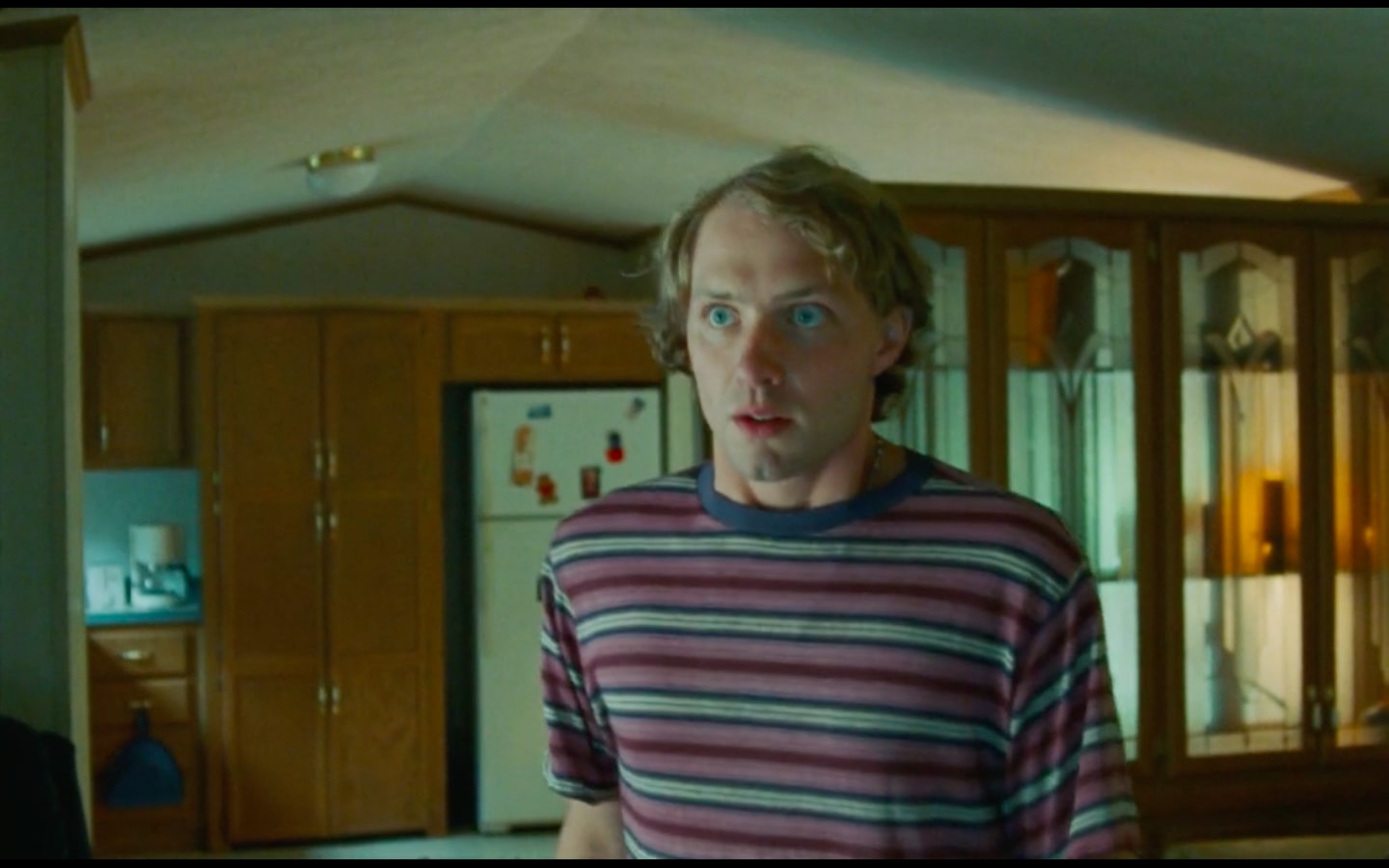 Cooper B. Handy (Lucy). Still from The Runner.
Cooper B. Handy (Lucy). Still from The Runner.
The movie’s last two tracks, “Escape” and “I Understand,” are not typical Boy Harsher songs. “Escape,” obviously, has a familiar theme, but its tone implies the action has already been resolved.
JM: I call that my Jim Morrison moment. We knew at that point what the movie was, and we knew we needed something that had written-in catharsis. I was trying to do that ‘70s swagger. Jim Morrison, love him or hate him, is super confident. The second half of “Escape” — maybe it's not resolved, but at least there's a confidence that the end is here. It's like, "Whatever, we're here, we lived it."
“I Understand” has a real sense of finality to it, like someone’s last words. What do you think makes for a good horror ending?
JM: Usually horror endings disappoint me. There's a lot of pressure to wrap everything up, which, in my opinion, isn't necessary. I really love sad endings. [To Gus]: What's your perfect ending?
AM: I like intensity. Intensity, and then a release.
